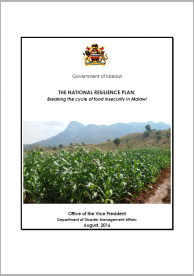
The broad objective of the plan is to help make Malawi resilient to disasters and break the cycle of food insecurity.
To achieve this, the following specific objectives will be pursued:
The following is a list of all conten labeled as "Capacity Development"

The broad objective of the plan is to help make Malawi resilient to disasters and break the cycle of food insecurity.
To achieve this, the following specific objectives will be pursued:

The need for a Disaster Risk Management Policy for Malawi has been felt through experiences and lessons learnt by government, civil society organisations and development partners in the coordination of disaster risk management activities in the country.
This policy will serve the following purposes:
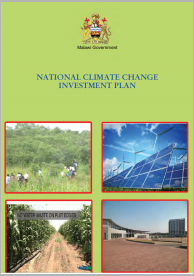
The primary objective of the National Climate Change Investment Plan (NCCIP) is to increase climate change investments in Malawi.

The programmme is a result of issues and concerns expresses by Malawians on food security, water and sanitation renewable energy, forest product and services, environment and indigenous knowledge.
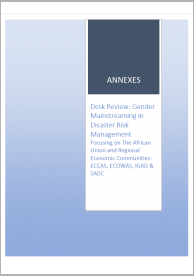
Annexes of key materials from "Gender Mainstreaming in Disaster Risk Management - Focusing on the African Union and Regional Economic Communities: ECCAS, ECOWAS, IGAD & SADC - A Desk Review".
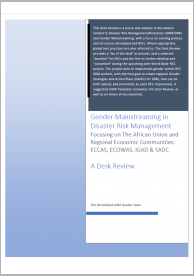
This Desk Review is a precis and analysis of documents related to Disaster Risk Management/Reduction (DRM/DRR) and Gender Mainstreaming; with a focus on existing policies and structures developed and RECs. Where appropriate, global best practices are also referred to.

This is the second report for the Programme ‘Building Disaster Resilience to Sub-Saharan African Regions, Countries and Communities’.
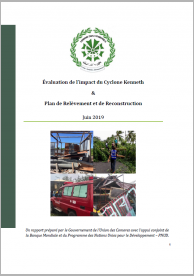
On April 24, 2019, the Union of Comoros was hit hard by Cyclone Kenneth, which affected 345,131 people, including more than 185,000, very severely.

The aim of this report was to highlight existing capacities, challenges and gaps, as well as make recommendations for strengthening national and local capacities regarding DRR (including climate change risks) through key sectors.

This document presents the results of the project "Assessment of natural risks in the Comoros" which was commissioned in order to analyse and assess the current situation; main challenges and issues; strengths and weaknesses as well as the country's potential needs for external assistance in disaster risk management.